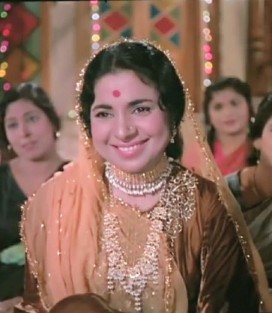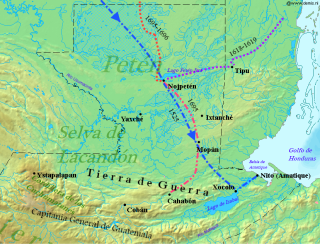
The Maya are an ethnolinguistic group of indigenous peoples of Mesoamerica. The ancient Maya civilization was formed by members of this group, and today's Maya are generally descended from people who lived within that historical region. Today they inhabit southern Mexico, Guatemala, Belize, and westernmost El Salvador and Honduras.

Acala or Achala, also known as Acalanātha or Āryācalanātha, is a wrathful deity and dharmapala prominent in Vajrayana Buddhism and East Asian Buddhism.
The Ch'ol (Chol) language is a member of the western branch of the Mayan language family used by the Ch'ol people in the states of Chiapas, Tabasco, and Campeche in Mexico. This language, together with Chontal, Ch'orti', and Ch'olti', constitute the Cholan language group.
The Chʼol are an Indigenous people of Mexico, mainly in the northern Chiapas highlands in the state of Chiapas. As one of the Maya peoples, their indigenous language is from the Mayan language family, known also as Chʼol. According to the 2000 Census, there were 140,806 speakers of Chʼol in Chiapas, including 40,000 who were monolingual.
Rahul is a popular male name in India and has a variety of meanings. The earliest meaning found in the Upanishads is "conqueror of all miseries." Later use of the word is attributed to the Buddha, who named his son Rahula as he felt that family ties could be an obstacle in the path to renunciation and nirvana. Buddha uttered Rahul when he first saw his son and gave a new meaning "relationship" and "bondage" to this name. Rahul means Moon, Able/efficient in Sanskrit and Pali. Rahul also means "Traveler" in Arabic.
Chanda is a poetic meter in Sanskrit.

Chʼoltiʼ is a dead language belonging to the Ch’olan branch of the Mayan family of languages. It was spoken in Belize and Guatemala prior to its extinction in the late eighteenth century. It and its sister language are now deemed likely descendants of Classic Mayan, the language represented in Mayan hieroglyphic writing.

Achala Sachdev was an Indian actress who appeared in classic films of Hindi language film industry, who started her career as a child actor. She later became known for mother and grandmother roles in Hindi films. Her most memorable roles were as Balraj Sahni's wife in Waqt (1965) and Kajol's grandmother in Dilwale Dulhania Le Jayenge (1995).

The Spanish conquest of Petén was the last stage of the conquest of Guatemala, a prolonged conflict during the Spanish colonisation of the Americas. A wide lowland plain covered with dense rainforest, Petén contains a central drainage basin with a series of lakes and areas of savannah. It is crossed by several ranges of low karstic hills and rises to the south as it nears the Guatemalan Highlands. The conquest of Petén, a region now incorporated into the modern republic of Guatemala, climaxed in 1697 with the capture of Nojpetén, the island capital of the Itza kingdom, by Martín de Ursúa y Arizmendi. With the defeat of the Itza, the last independent and unconquered native kingdom in the Americas fell to European colonisers.

The Lakandon Chʼol were a former Chʼol-speaking Maya people inhabiting the Lacandon Jungle in what is now Chiapas in Mexico and the bordering regions of northwestern Guatemala, along the tributaries of the upper Usumacinta River and the foothills of the Sierra de los Cuchumatanes.

The Manche Chʼol were a Maya people who constituted the former Manche Chʼol Territory, a Postclassic polity of the southern Maya Lowlands, within the extreme south of what is now Petén and the area around Lake Izabal in northern Guatemala, and southern Belize. The Manche Chʼol took the name Manche from the name of their main settlement. They were the last of a set of Ch'olan-speaking groups in the eastern Maya Lowlands to remain independent and ethnically distinct. It is likely that they were descended from the inhabitants of Classic period Maya cities in the southeastern Maya Lowlands, such as Nim Li Punit, Copán and Quiriguá.

The Acala Chʼol were a former Chʼol-speaking Maya people who occupied a territory to the west of the Manche Chʼol and east of the Chixoy River in what is now the Alta Verapaz Department of Guatemala. The Acala should not be confused with the people of the former Maya territory of Acalan, near the Laguna de Terminos in Mexico.
The Spanish conquest of Chiapas was the campaign undertaken by the Spanish conquistadores against the Late Postclassic Mesoamerican polities in the territory that is now incorporated into the modern Mexican state of Chiapas. The region is physically diverse, featuring a number of highland areas, including the Sierra Madre de Chiapas and the Montañas Centrales, a southern littoral plain known as Soconusco and a central depression formed by the drainage of the Grijalva River.
Domingo de Vico was a Spanish Dominican friar during the Spanish conquest of Chiapas and the conquest of Guatemala in the 16th century. He was originally from Jaén. Chronicler Antonio de Remesal recorded that de Vico studied theology in Úbeda and finished his studies in the San Esteban convent in Salamanca.
Achala-simha was a Sanskrit-language poet from India, who lived in the 12th century or earlier. His verses appear in several anthologies of Sanskrit poems.
This page is based on this
Wikipedia article Text is available under the
CC BY-SA 4.0 license; additional terms may apply.
Images, videos and audio are available under their respective licenses.






